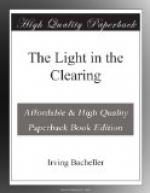The stranger was buried. There was nothing upon him to indicate his name or residence. Weeks passed with no news of the man who had slain him. I had told of the gun with a piece of wood broken out of its stock, but no one knew of any such weapon in or near Lickitysplit.
One day Uncle Peabody and I drove up to Grimshaw’s to make a payment of money. I remember it was gold and silver which we carried in a little sack. I asked where Amos was and Mrs. Grimshaw—a timid, tired-looking, bony little woman who was never seen outside of her own house—said that he was working out on the farm of a Mr. Beekman near Plattsburg. He had gone over on the stage late in June to hire out for the haying. I observed that my uncle looked very thoughtful as we rode back home and had little to say.
“You never had any idee who that robber was, did ye?” he asked by and by.
“No—I could not see plain—it was so dusk,” I said.
“I think Purvis lied about the gang that chased him,” he said. “Mebbe he thought they was after him. In my opinion he was so scairt he couldn’t ‘a’ told a hennock from a handsaw anyway. I think it was just one man that did that job.”
How well I remember the long silence that followed and the distant voices that flashed across it now and then—the call of the mire drum in the marshes and the songs of the winter wren and the swamp robin. It was a solemn silence.
The swift words, “Your money or your life,” came out of my memory and rang in it. I felt its likeness to the scolding demands of Mr. Grimshaw, who was forever saying in effect:
“Your money or your home!”
That was like demanding our lives because we couldn’t live without our home. Our all was in it. Mr. Grimshaw’s gun was the power he had over us, and what a terrible weapon it was! I credit him with never realizing how terrible.
We came to the sand-hills and then Uncle Peabody broke the silence by saying:
“I wouldn’t give fifty cents for as much o’ this land as a bird could fly around in a day.”
Then for a long time I heard only the sound of feet and wheels muffled in the sand, while my uncle sat looking thoughtfully at the siding. When I spoke to him he seemed not to hear me.
Before we reached home I knew what was in his mind, but neither dared to speak of it.
People came from Canton and all the neighboring villages to see and talk with me and among them were the Dunkelbergs. Unfounded tales of my bravery had gone abroad.
Sally seemed to be very glad to see me. We walked down to the brook and up into the maple grove and back through the meadows.
The beauty of that perfect day was upon her. I remember that her dress was like the color of its fire-weed blossoms and that the blue of its sky was in her eyes and the yellow of its sunlight in her hair and the red of its clover in her cheeks. I remember how the August breezes played with her hair, flinging its golden curving strands about her neck and shoulders so that it touched my face, now and then, as we walked! Somehow the rustle of her dress started a strange vibration in my spirit. I put my arm around her waist and she put her arm around mine as we ran along. A curious feeling came over me. I stopped and loosed my arm.




